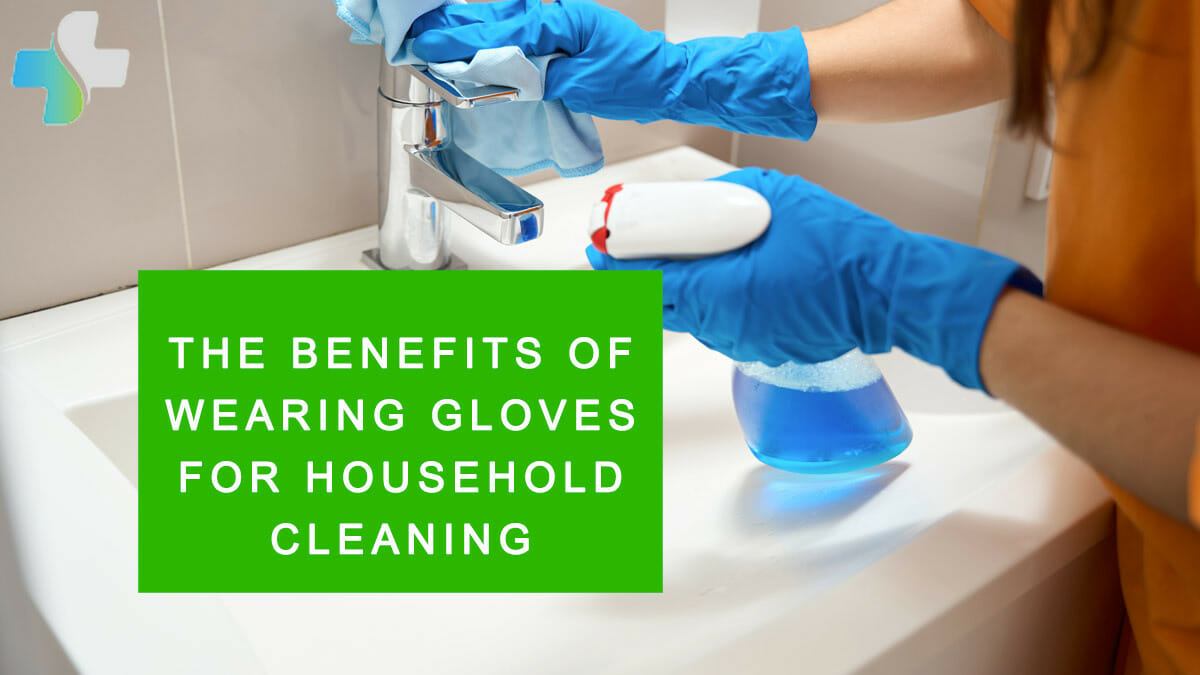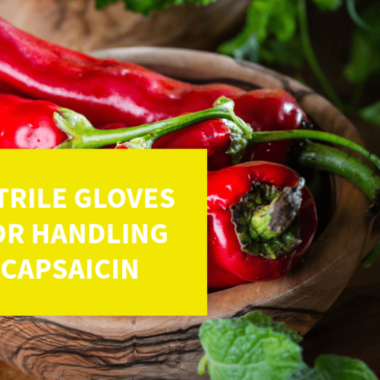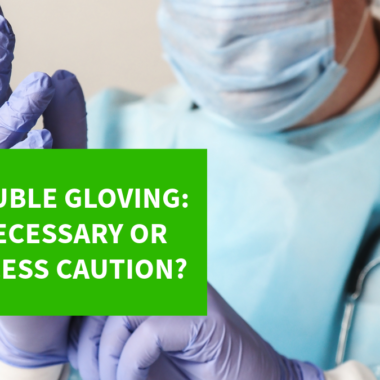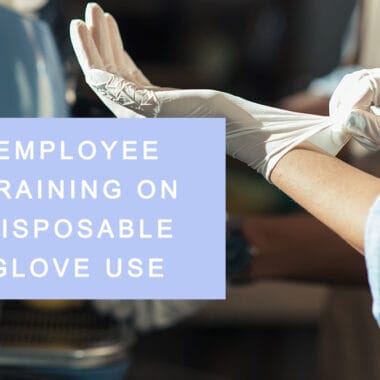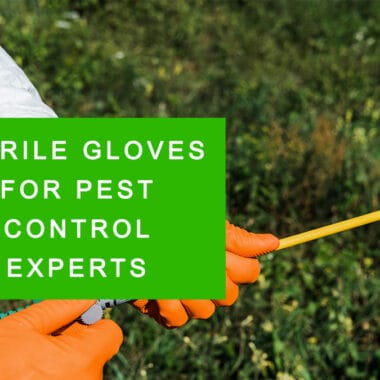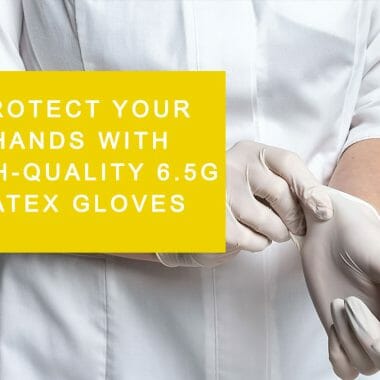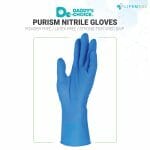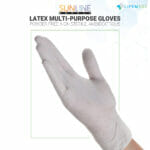Cleaning your house without gloves on can be incredibly dangerous due to the chemicals in the products, the bacteria you’re cleaning, and their impact on the human body. Wearing disposable gloves while cleaning creates a barrier of protection between the chemicals, germs, and your skin. The chemicals and ingredients used in cleaning products can irritate and dry out the skin or, at worst, leave chemical burns. Rubber disposable gloves, either nitrile or latex, are the most reliable for cleaning and sanitizing.
Most Toxic Household Cleaners and Chemicals
Whether you use store-bought household cleaners, “all-natural,” or homemade—almost all products contain an ingredient that can harm your skin. Most products include solvents, which are found in all-purpose cleaners, or detergents, which are found in most dish soaps. Other harmful cleaning ingredients for the skin are bleach, vinegar, lye, and ammonia.
Some of the most toxic household cleaners are products we use weekly and sometimes daily.
The most dangerous household cleaning supplies are:
- Bleach—contains sodium hypochlorite, which is highly corrosive and causes chemical burns if in contact with the skin or eyes. When combined with other cleaning chemicals, such as ammonia or acids, bleach can discharge toxic gases like chlorine, causing respiratory problems.
- Ammonia—is highly alkaline, causing skin and eye irritation and respiratory problems if inhaled. When mixed with bleach, it can generate toxic gases that can be harmful or even life-threatening.
- Oven cleaners—often contain lye (sodium hydroxide) or other corrosive chemicals that can cause severe burns if in contact with the skin or eyes. They can also release toxic fumes if misused or mixed with other chemicals.
- Drain cleaners—can contain highly abrasive chemicals like sulfuric acid or sodium hydroxide that can cause severe burns and tissue damage if ingested or in contact with the skin or eyes. Inhaling the fumes from these products can also result in respiratory problems.
- Furniture polish—(some) contain toxic chemicals like nitrobenzene or petroleum distillates, which can also cause respiratory problems and skin irritation. Inhaling the fumes from these products can cause nausea, dizziness, and many other symptoms.
Not only is it unhealthy and unsafe to breathe these toxic chemicals in, but it is also hazardous to handle them without gloves.
Reasons You Should Wear Gloves While Cleaning
Wearing gloves when cleaning prevents chemical burns, skin irritation, and bacterial infection while protecting the skin and body in many other ways. If you’re cleaning your house, putting on gloves might be an afterthought or something you don’t consider since it’s your place. Just because it’s your house and “your” germs doesn’t mean they can’t negatively impact you. Gloves aren’t just protecting you from the bacteria you’re cleaning; they’re protecting you from the chemicals you’re using. The substances and germs have all transferred to your hands and will then transfer to everything you touch. Even after you wash your hands, bacteria and liquids can remain underneath your fingernails. The safest way to clean is to wear a pair of disposable gloves while doing it.
Protection From Harmful Chemicals
The main issue with cleaning products and household supplies is the toxic chemicals and ingredients they’re made with. A pair of cleaning gloves—either latex or nitrile—are created with a durable rubber that is made to be chemical-resistant. While cleaning, other dangerous chemicals you encounter are formaldehyde, sodium hydroxide, hydrochloric acid, and petroleum distillates. Disposable gloves for cleaning are specifically designed to help protect your skin from these corrosive chemicals.
Avoiding Skin Irritation and Punctures
Whether or not you have sensitive skin, most skin types are not built to withstand the chemicals in cleaning products. When cleaning, gloves also protect your hands from scrapes or punctures from sharp objects. Having to put your hands in hot water mixed with products consistently is especially harmful due to the combination of germs, chemicals, and the temperature of the water. This can dry out your skin by removing the natural balance of oils and moisture, resulting in redness, itchiness, and inflammation.
Preventing Infection and Spreading of Bacteria
When using household cleaners, the surfaces and areas you clean are surrounded by germs and bacteria. Cleaning areas like the bathroom, kitchen sink, and toilet with bare hands puts you at risk of infecting yourself. Reused cleaning utensils—such as sponges—hold tons of bacteria and germs. Wearing nitrile gloves while cleaning can protect your skin against pathogens, salmonella, E.coli (Escherichia coli) bacteria, etc.
Preserving Hygiene and Cleanliness
If you’re cleaning without gloves, all the bacteria and chemicals that have come into contact with your skin are not guaranteed to wash off. Germs and contaminants can get under your nails, which could then be transferred to your mouth and skin. Gloves protect from transferring germs and chemicals to another surface, person, or object—also known as cross-contamination.
Preventing Cross-Contamination
When cleaning with your bare hands, it can be easy to forget to wash your hands before touching either your face or another object or surface. Wearing gloves creates a mental awareness for yourself when you clean and think about touching something else. Before touching our faces, getting a drink, or picking up another object, we’ll consider taking off our gloves before we do it. Touching other objects or surfaces with our hands or gloves transfers whatever was on our hands onto that surface. Not to mention, gloves protect our hands from all the bacteria, contaminants, and chemicals we’re in contact with.
Overall, wearing disposable gloves while cleaning is highly recommended to help maintain better skin health and protection, good hygiene, and prevention from infection.
References:
- Healthline, 2020. “Bacterial Cross-Contamination: All You Need to Know.“

